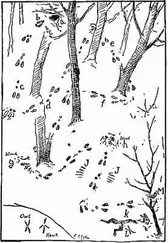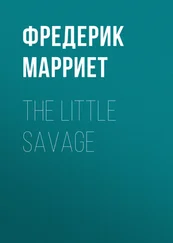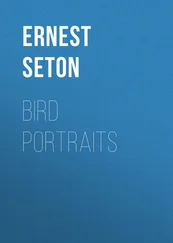Ernest Seton - Two Little Savages
Здесь есть возможность читать онлайн «Ernest Seton - Two Little Savages» весь текст электронной книги совершенно бесплатно (целиком полную версию без сокращений). В некоторых случаях можно слушать аудио, скачать через торрент в формате fb2 и присутствует краткое содержание. Год выпуска: 2004, Жанр: Детские приключения, на английском языке. Описание произведения, (предисловие) а так же отзывы посетителей доступны на портале библиотеки ЛибКат.
- Название:Two Little Savages
- Автор:
- Жанр:
- Год:2004
- ISBN:нет данных
- Рейтинг книги:5 / 5. Голосов: 1
-
Избранное:Добавить в избранное
- Отзывы:
-
Ваша оценка:
- 100
- 1
- 2
- 3
- 4
- 5
Two Little Savages: краткое содержание, описание и аннотация
Предлагаем к чтению аннотацию, описание, краткое содержание или предисловие (зависит от того, что написал сам автор книги «Two Little Savages»). Если вы не нашли необходимую информацию о книге — напишите в комментариях, мы постараемся отыскать её.
Two Little Savages — читать онлайн бесплатно полную книгу (весь текст) целиком
Ниже представлен текст книги, разбитый по страницам. Система сохранения места последней прочитанной страницы, позволяет с удобством читать онлайн бесплатно книгу «Two Little Savages», без необходимости каждый раз заново искать на чём Вы остановились. Поставьте закладку, и сможете в любой момент перейти на страницу, на которой закончили чтение.
Интервал:
Закладка:
"I have been obliged to read the Bible all my life. Every day I read a chapter; but I do not love it. I read it because I am forced to do it. It tells me nothing I want to know. It does not teach me to love God, which you say is the one thing needful. But I go out into the woods, and every bird and flower I see stirs me to the heart with something, I do not know what it is; only I love them: I love them with all my strength, and they make me feel like praying when your Bible does not. They are my Bible. This is my nature. God made me so."
The mother was silent after this, but Yan could 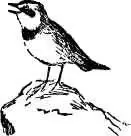 see that she was praying for him as for a lost soul.
see that she was praying for him as for a lost soul.
A few days later they were out walking in the early spring morning. A Shore-lark on a clod whistled prettily as it felt the growing sunshine.
Yan strained his eyes and attention to take it in. He crept up near it. It took wing, and as it went he threw after it a short stick he was carrying. The stick whirled over and struck the bird. It fell fluttering. Yan rushed wildly after it and caught it in spite of his mother's calling him back.
He came with the bird in his hand, but it did not live many minutes. His mother was grieved and disgusted. She said. "So this is the great love you have for the wild things; the very first spring bird to sing you must club to death. I do not understand your affections. Are not two sparrows sold for one farthing, and yet not one of them falls to the ground without the knowledge of your heavenly Father."
Yan was crushed. He held the dead bird in his hand and said, contradictorily, as the tears stood in his eyes, "I wish I hadn't; but oh, it was so beautiful."
He could not explain, because he did not understand, and yet was no hypocrite.
Weeks later a cheap trip gave him the chance for the first time in his life to see Niagara. As he stood with his mother watching the racing flood, in the gorge below the cataract, he noticed straws, bubbles and froth, that seemed to be actually moving upstream. He said:
"Mother, you see the froth how it seems to go up-stream."
"Well!"
"Yet we know it is a trifle and means nothing. We know that just below the froth is the deep, wide, terrible, irresistible, arrowy flood, surging all the other way."
"Yes, my son."
"Well, Mother, when I killed the Shore-lark, that was froth going the wrong way, I did love the little bird. I know now why I killed it. Because it was going away from me. If I could have seen it near and could have touched it, or even have heard it every day, I should never have wished to harm it. I didn't mean to kill it , only to get it . You gather flowers because you love to keep them near you, not because you want to destroy them. They die and you are sorry. I only tried to gather the Shore-lark as you would a flower. It died, and I was very, very sorry."
"Nevertheless," the mother replied, "the merciful man is merciful unto his beast. He who hearkens when the young Ravens cry, surely took note of it, and in His great Book of Remembrance it is written down against you."
And from that time they surely drifted apart.
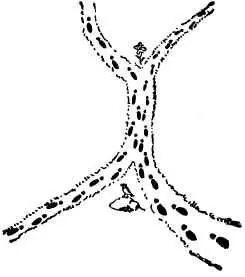
PART II
SANGER  SAM
SAM
I
The New Home
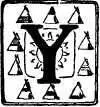 AN was now fourteen years old long-legged, thin, and growing fast The doctor marked this combination and said: "Send him on a farm for a year."
AN was now fourteen years old long-legged, thin, and growing fast The doctor marked this combination and said: "Send him on a farm for a year."
Thus it was that an arrangement was made for Yan to work for his board at the farmhouse of William Raften of Sanger.
Sanger was a settlement just emerging from the early or backwoods period.
The recognized steps are, first, the frontier or woods where all is unbroken forest and Deer abound; next the backwoods where small clearings appear; then a settlement where the forest and clearings are about equal and the Deer gone; last, an agricultural district, with mere shreds of forest remaining.
Thirty years before, Sanger had been "taken up" by a population chiefly from Ireland, sturdy peasantry for the most part, who brought with them the ancient feud that has so long divided Ireland—the bitter quarrel between the Catholics or "Dogans" (why so called none knew) and Protestants, more usually styled "Prattisons." The colours of the Catholics were green and white; of the Protestants orange and blue; and hence another distinctive name of the latter was "Orangemen."
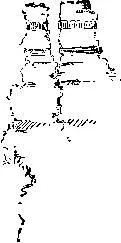
These two factions split the social structure in two vertically. There were, in addition, several horizontal lines of cleavage which, like geological seams, ran across both segments.
In those days, the early part of the nineteenth century, the British Government used to assist desirable persons who wished to emigrate to Canada from Ireland. This aid consisted of a free ocean passage. Many who could not convince the Government of their desirability and yet could raise the money, came with them, paying their regular steerage rate of $15. These were alike to the outside world, but not to themselves. Those who paid their way were "passengers," and were, in their own opinion, many social worlds above the assisted ones, who were called "Emmy Grants." This distinction was never forgotten among the residents of Sanger. 
Yet two other social grades existed. Every man and boy in Sanger was an expert with the axe; was wonderfully adroit. The familiar phrase, "He's a good man," had two accepted meanings: If obviously applied to a settler during the regular Saturday night Irish row in the little town of Downey's Dump, it meant he was an able man with his fists; but if to his home life on the farm, it implied that he was unusually dexterous with the axe. A man who fell below standard was despised. Since the houses of hewn logs were made by their owners, they reflected the axemen's skill. There were two styles of log architecture; the shanty with corners criss-cross, called hog-pen finish, and the other, the house with the corners neatly finished, called  dovetail finish. In Sanger it was a social black eye to live in a house of the first kind. The residents were considered "scrubs" or "riff-raff" by those whose superior axemanship had provided the more neatly finished dwelling. A later division crept in among the "dovetailers" themselves when a brickyard was opened. The more prosperous settlers put up neat little brick houses. To the surprise of all, one Phil O'Leary, a poor but prolific Dogan, leaped at once from a hog-pen log to a fine brick, and caused no end of perplexity to the ruling society queens, simply paralyzing the social register, since his nine fat daughters now had claims with the best. Many, however, whose brick houses were but five years old, denounced the O'Learys as upstarts and for long witheld all social recognition. William Raften, as the most prosperous man in the community, was first to appear in red bricks. His implacable enemy, Char-less (two syllables) Boyle, egged on by his wife, now also took the red brick plunge, though he dispensed with masons and laid the bricks himself, with the help of his seventeen sons. These two men, though Orangemen both, were deadly enemies, as the wives were social rivals. Raften was the stronger and richer man, but Boyle, whose father had paid his own steerage rate, knew all about Raften's father, and always wound up any discussion by hurling in Raften's teeth: "Don't talk to me, ye
dovetail finish. In Sanger it was a social black eye to live in a house of the first kind. The residents were considered "scrubs" or "riff-raff" by those whose superior axemanship had provided the more neatly finished dwelling. A later division crept in among the "dovetailers" themselves when a brickyard was opened. The more prosperous settlers put up neat little brick houses. To the surprise of all, one Phil O'Leary, a poor but prolific Dogan, leaped at once from a hog-pen log to a fine brick, and caused no end of perplexity to the ruling society queens, simply paralyzing the social register, since his nine fat daughters now had claims with the best. Many, however, whose brick houses were but five years old, denounced the O'Learys as upstarts and for long witheld all social recognition. William Raften, as the most prosperous man in the community, was first to appear in red bricks. His implacable enemy, Char-less (two syllables) Boyle, egged on by his wife, now also took the red brick plunge, though he dispensed with masons and laid the bricks himself, with the help of his seventeen sons. These two men, though Orangemen both, were deadly enemies, as the wives were social rivals. Raften was the stronger and richer man, but Boyle, whose father had paid his own steerage rate, knew all about Raften's father, and always wound up any discussion by hurling in Raften's teeth: "Don't talk to me, ye 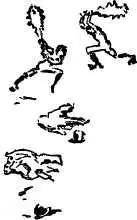 upstart. Everybody knows ye are nothing but a Emmy Grant." This was the one fly in the Raften ointment. No use denying it. His father had accepted a free passage, true, and Boyle had received a free homestead, but what of that—that counted for nothing. Old Boyle had been a "PASSENGER," old Raften an "EMMY GRANT."
upstart. Everybody knows ye are nothing but a Emmy Grant." This was the one fly in the Raften ointment. No use denying it. His father had accepted a free passage, true, and Boyle had received a free homestead, but what of that—that counted for nothing. Old Boyle had been a "PASSENGER," old Raften an "EMMY GRANT."
Интервал:
Закладка:
Похожие книги на «Two Little Savages»
Представляем Вашему вниманию похожие книги на «Two Little Savages» списком для выбора. Мы отобрали схожую по названию и смыслу литературу в надежде предоставить читателям больше вариантов отыскать новые, интересные, ещё непрочитанные произведения.
Обсуждение, отзывы о книге «Two Little Savages» и просто собственные мнения читателей. Оставьте ваши комментарии, напишите, что Вы думаете о произведении, его смысле или главных героях. Укажите что конкретно понравилось, а что нет, и почему Вы так считаете.

